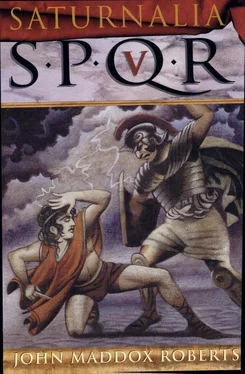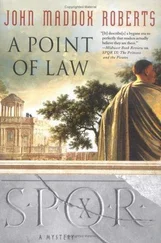John Roberts - Saturnalia
Здесь есть возможность читать онлайн «John Roberts - Saturnalia» весь текст электронной книги совершенно бесплатно (целиком полную версию без сокращений). В некоторых случаях можно слушать аудио, скачать через торрент в формате fb2 и присутствует краткое содержание. Год выпуска: 0101, ISBN: 0101, Издательство: St. Martin, Жанр: Исторический детектив, на английском языке. Описание произведения, (предисловие) а так же отзывы посетителей доступны на портале библиотеки ЛибКат.
- Название:Saturnalia
- Автор:
- Издательство:St. Martin
- Жанр:
- Год:0101
- ISBN:9780312320188
- Рейтинг книги:4 / 5. Голосов: 1
-
Избранное:Добавить в избранное
- Отзывы:
-
Ваша оценка:
- 80
- 1
- 2
- 3
- 4
- 5
Saturnalia: краткое содержание, описание и аннотация
Предлагаем к чтению аннотацию, описание, краткое содержание или предисловие (зависит от того, что написал сам автор книги «Saturnalia»). Если вы не нашли необходимую информацию о книге — напишите в комментариях, мы постараемся отыскать её.
Saturnalia — читать онлайн бесплатно полную книгу (весь текст) целиком
Ниже представлен текст книги, разбитый по страницам. Система сохранения места последней прочитанной страницы, позволяет с удобством читать онлайн бесплатно книгу «Saturnalia», без необходимости каждый раз заново искать на чём Вы остановились. Поставьте закладку, и сможете в любой момент перейти на страницу, на которой закончили чтение.
Интервал:
Закладка:
“I am always happy to meet another Caecilius Metellus,” he said. The ubiquity of my family was a byword in Rome.
“Tribune Vatinius was responsible for securing Caesar’s extraordinary commission in Gaul,” Clodia gushed. If there was anything she loved more than luxury it was power politics.
“A most unusual expedient to deal with the Gallic situation,” I said.
“It’s a reform long overdue,” Vatinius asserted.
“Reform? Do you mean this is something we can look forward to seeing again?”
“Of course. We have to stop pretending we live in the days of our ancestors. We have a vast empire all over the world, and we try to govern it as if Rome were still a little Italian city-state. The way we change offices every year is absurd! A man no sooner learns his task or the territory he is to govern when he is out of office.”
“Who would want to hold an office like the quaestorship or the aedileship for more than a year?” I objected.
He chuckled. “Very true. No, I spoke of the offices that hold imperium: praetor and consul. Most specifically, propraetor and proconsul. A one-year stint governing a province was one thing when our holdings were just a few days’ march from Rome, but it’s utterly obsolete now. You can take weeks if not months just getting to your province. Just about the time you’ve learned your way around, it’s time to go home.”
“You can usually get a command prorogued for another year or two,” I said.
“But you never know! ” he said with some heat. “And if you want to stand for office again, you have to drop everything and hurry back to Rome, even if you’re in the middle of a war. This new way is better. Caesar goes to Gaul knowing he has five years to sort out that situation and bring it to a satisfactory conclusion. Plus, he has imperium over both Gauls plus Illyricum; so if he has the barbarians on the run, they can’t just duck across the border where he’ll have to coordinate with another proconsul.” It was one of the rules that a promagistrate wielded imperium only within the borders of his assigned province. If he tried to use it outside them he risked being charged with treason.
“It is a well thoughtout policy,” I admitted.
“Believe me, it is the only policy from here on,” he insisted. “And we need further legislation to allow a serving promagistrate to stand for office in absentia. If a legate can run a province or an army in the magistrate’s absence, why not one to conduct an election campaign back home?”
There was considerable justice in his reasoning. The truth was that our ancient system of republican government was dreadfully awkward and unwieldy. It was aimed at thwarting the dangerous practice of concentrating too much power in the hands of one man. Sensible as his solution was (and I had no doubt that it was Caesar’s solution, not his), I still hated the idea of giving anyone that much power for that long a time. After five years, especially if he was victorious in battle, all the legions in Gaul would belong solely to Caesar and to no other. Not that this was anything new. Pompey’s legions were Pompey’s, not Rome’s.
“Oh, and you must know the aedile Calpurnius Bestia,” Clodia said.
“We spoke just this morning,” Bestia said. “Did you find your fortune-teller, Decius?” His beefy, intelligent face creased into a smile as he took my hand.
“Fortune-teller?” said Clodia, lifting an eyebrow in my direction. “Decius, you’ve changed. What happened to your renowned scepticism?”
“Egypt does that to you,” I said. “It puts you in touch with otherworldly things.”
“Come along, Decius,” she said, tugging at my arm. “If you’re going to lie to me, you might as well get drunk and do it convincingly.” She took me to a table that was covered with goblets and picked one up and handed it to me. “Now, who haven’t you met?” As she scanned the room I set the goblet down and picked up another. She gestured and a tiny, stunningly voluptuous young woman came to us.
“Decius, have you met Fulvia? She and my brother are to marry.”
“Yes, I met her here about two years ago. You are more beautiful than ever, if that is possible, Fulvia. But I expected you to be married by now.” She truly was stunning, with white-blonde hair piled atop her head in the latest style, held in place by tortoise shell combs and silver skewers.
“Clodius intends to celebrate our nuptials after he takes office.” I remembered that furry, palpitation-inducing voice. “He plans to throw a vast celebration for the whole populace, with games and a free distribution of food and oil and everyone’s attendance at the baths paid for for the whole month.”
“Sounds like a wonderful party,” I said, trying to figure out what such a thing would cost.
“He’s hired more than a hundred gladiators from Capua to come up to Rome to fight another troupe from the Statilian school,” Fulvia said with unmaidenly relish.
“Munera at a wedding?” I said, aghast.
“Oh, technically the munera will be in honor of our late father, to keep everything legal,” Clodia explained, “and they’ll be on a day set aside solely for that purpose, but everyone will know that it’s part of the wedding celebration.”
“And it will win Clodius no end of popularity, I’m sure,” I said. Oh, well, I thought, so what if the old boy died almost twenty years ago. It’s never too late for funeral games.
“He’s already the most popular man in Rome,” Clodia purred. “This, plus his enactions in office, will make him the next thing to king of Rome.”
This was just the sort of thing I liked to hear. Yes, next year would definitely be a good one to stay as far from Rome as possible. If, of course, I survived this year. I was about to make some ill-considered remark about the annually sacrificed King of Fools when I was saved by the arrival of another guest, none other than Marcus Licinius Crassus Dives, third of the Big Three after Caesar and Pompey and richer than the other two and the rest of the world put together. I exaggerate, but he was awfully rich. Clodia dragged him over.
“When did you get back, Marcus?” Clodia crowed. Another returnee. “When I sent my invitation to your house I really didn’t expect you’d be there. How lucky for me you were!” She didn’t bother with introductions. Everyone knew who Crassus was, and if he didn’t know you, you probably weren’t worth knowing.
“My dear, you know I’d have run all the way from Campania to attend one of your gatherings,” he said, grinning and showing some new, deep lines in his face. In fact, he looked tired all over. “I got back to the City last night, and I’ve given my slaves orders to tie me up if I ever talk about leaving again.”
“Is that where you’ve been, Marcus Licinius?” I asked.
“Got away from Rhodes, eh, Decius Caecilius? Lucky you. Yes, I’ve been most of the year organizing the new Capuan colony and a duller, more onerous job I’ve never had. The Senate formed a judicial board to oversee the settlement of Pompey’s veterans and Caesar’s paupers on the new lands under the new agrarian law, and they named me to head the board. When Caius Cosconius died last summer the Senate asked Cicero to replace him, but he had the brains to refuse.”
“Oh, but such important work, Marcus,” Clodia said. “It’s the biggest and most important task to face the government since the wars with Carthage. No wonder the Senate wanted you and no other to be in charge.” I had never rated such flattery from Clodia.
Crassus shrugged. “A clerk’s job, but it had to be done.” His words were blunt and commonsense, but I could see the self-satisfaction oozing all over him with her words. Clodia dashed off to deal with a new guest, Fulvia in tow, leaving me temporarily with Crassus.
Читать дальшеИнтервал:
Закладка:
Похожие книги на «Saturnalia»
Представляем Вашему вниманию похожие книги на «Saturnalia» списком для выбора. Мы отобрали схожую по названию и смыслу литературу в надежде предоставить читателям больше вариантов отыскать новые, интересные, ещё непрочитанные произведения.
Обсуждение, отзывы о книге «Saturnalia» и просто собственные мнения читателей. Оставьте ваши комментарии, напишите, что Вы думаете о произведении, его смысле или главных героях. Укажите что конкретно понравилось, а что нет, и почему Вы так считаете.









